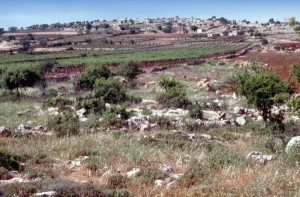
English: Joseph and His Brethren Welcomed by Pharaoh, watercolor by James Tissot (Photo credit: Wikipedia)
Stephen’s speech before the Sanhedrin continues with the account of Joseph. He recounts how his brothers were jealous of him and sold him into Egypt. But he says that God was with him — that He gave Joseph favor and wisdom before Pharaoh so that he was made to be a ruler over Egypt. An important point to note here (and in the rest of Stephen’s Spirit-filled account of history) is that in each section of time, Stephen continues to show God’s unfailing love and care in all sorts of circumstances.
He goes on to talk about the famine and how Jacob and his family came to live there after Joseph made himself know to his brothers. Stephen mentions 75 coming to live there, whereas Exodus 1:5 says there were 70. But the differences in the Hebrew and the Septuagint can be explained and they harmonize fine (as if it really matters). A good explanation of that subject can be found in this article at ApologeticsPress.org.
(This year’s reading plan for Luke, Acts, and 1 and 2 Chronicles averages just 15 verses per day – 5 days per week!)
Schedule for this week
Read or listen to audio of today’s selection from Acts here
Read or listen to audio of today’s selection from 2 Chronicles here
/Bob’s boy
___________________
some images © V. Gilbert & Arlisle F. Beers
Please visit this site’s menu item “The Author’s Books” to find out about my published and upcoming books, and for a link to my Facebook Author’s Page.
All of my comments in this blog are solely my responsibility. When reading ANY commentary, you should ALWAYS refer first to the scripture, which is God’s unchanging and unfailing word.






